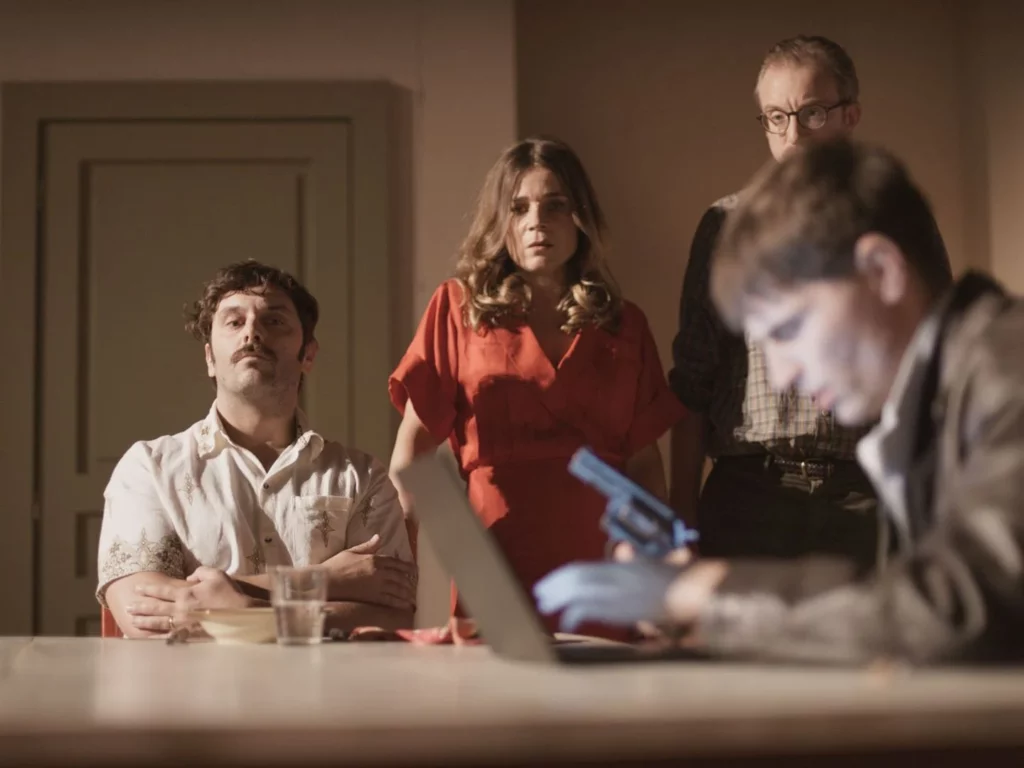
Quentin Dupieux is one of the most original, innovative and downright wacky movie directors around. All his films have started from a completely absurd premise; for example, in Deerskin, the protagonist falls in love with a deerskin jacket that speaks to him; in Mandibles (Mandibules), two friends discover a giant fly in the back of their car and try to find ways of making money from it; while Smoking Causes Coughing (Fumer Fait Tousser) revolves around a group of five superheroes called the Tobacco Force, who go on a retreat together.
It comes as a surprise then to find that his latest offering, Yannick, involves no such surreal plot lines and is situated in a single building, the boulevard theater Les Bouffes Parisiens. The film starts with a sparsely populated audience watching a conventional and seemingly mediocre play called Le Cocu (The Cuckold). The performance is suddenly interrupted by an audience member, Yannick (Raphaël Quenard), who stands up to declare that he finds the play unacceptably bad.
We discover that Yannick is a nighttime security guard who has had to take time off from work to travel from his home in Melun (about 40 kilometers from Paris) to see the play. The three actors onstage (played by Pio Marmaï, Blanche Gardin and Sébastien Chassagne) speak politely but condescendingly to the increasingly unhinged Yannick and eventually persuade him to leave the theater. However, while collecting his coat in the foyer, he hears the actors parodying and mocking him, which prompts him to return to the theater, where he unveils a gun and holds both actors and audience hostage. Everyone is then forced to wait as Yannick writes his own script for the actors to perform.
Even if Yannick is not absurdist in the manner of Dupieux’s earlier films, it is always inventively quirky, at times hilarious – the scene where Yannick procures an audience member’s laptop and asks him for his password is a particular gem – and yet also moving. Dupieux always shows empathy for the little person who is not normally given priority in the cinema. I particularly enjoyed Yannick’s interaction with members of the audience, especially the married couple who ran a driving school.
In the title role, Quenard is superb: he remains utterly believable, both dangerously unstable and yet also likable. Of the other main actors, Gardin, who since her breakthrough role in Tout le Monde Aime Jeanne has been playing a variety of roles onscreen, is utterly watchable and nuanced. Marmaï shows convincingly the brittle psychology of the character he is playing.
Lasting little more than an hour – all of Dupieux’s films are refreshingly short – the movie also reflects interestingly on the creative process: if the long tradition of French boulevard theater is in some ways satirized, it also makes some interesting comparisons between film-making and the live experience of the theater. This is certainly Dupieux’s most theatrical movie to date, as the camera never leaves the confines of the Bouffes Parisiens, and the fact that actors onstage can never fail to be aware of the audience watching them shows how potentially dangerous – and inspiring – that “liveness” can be, in a way that the cinema can never be.
Favorite